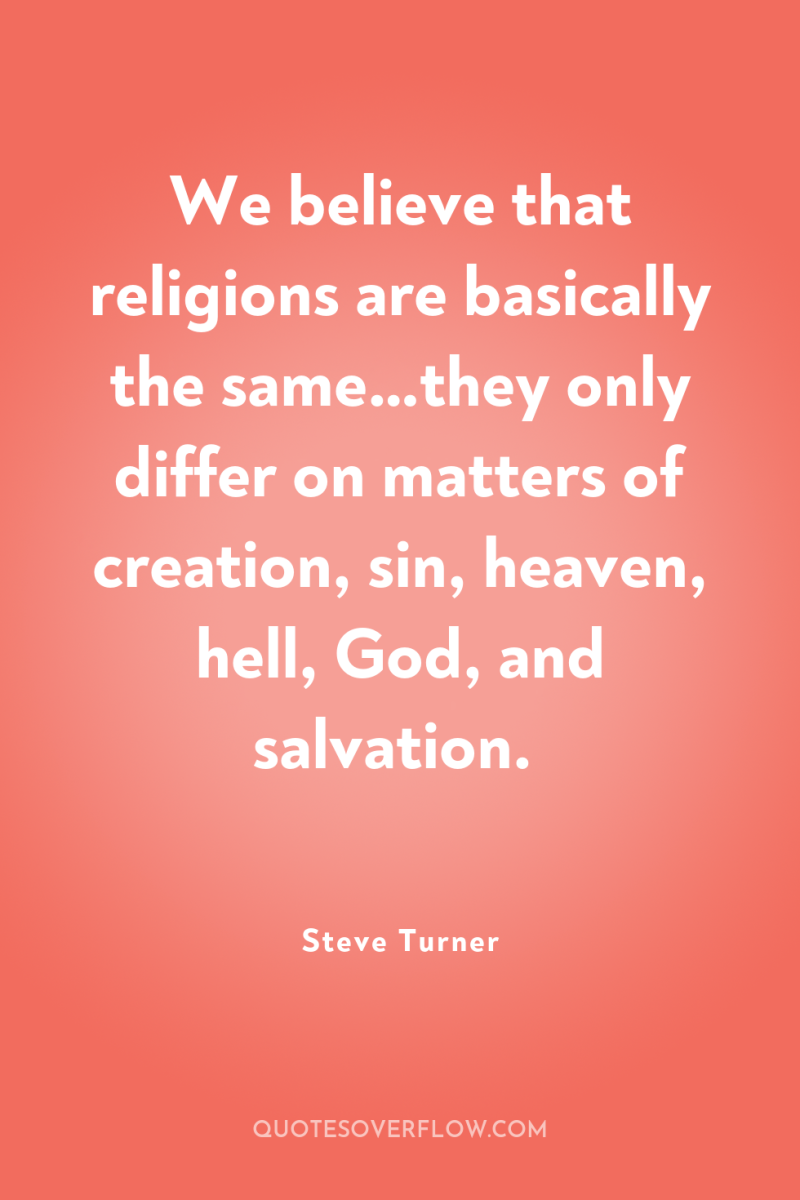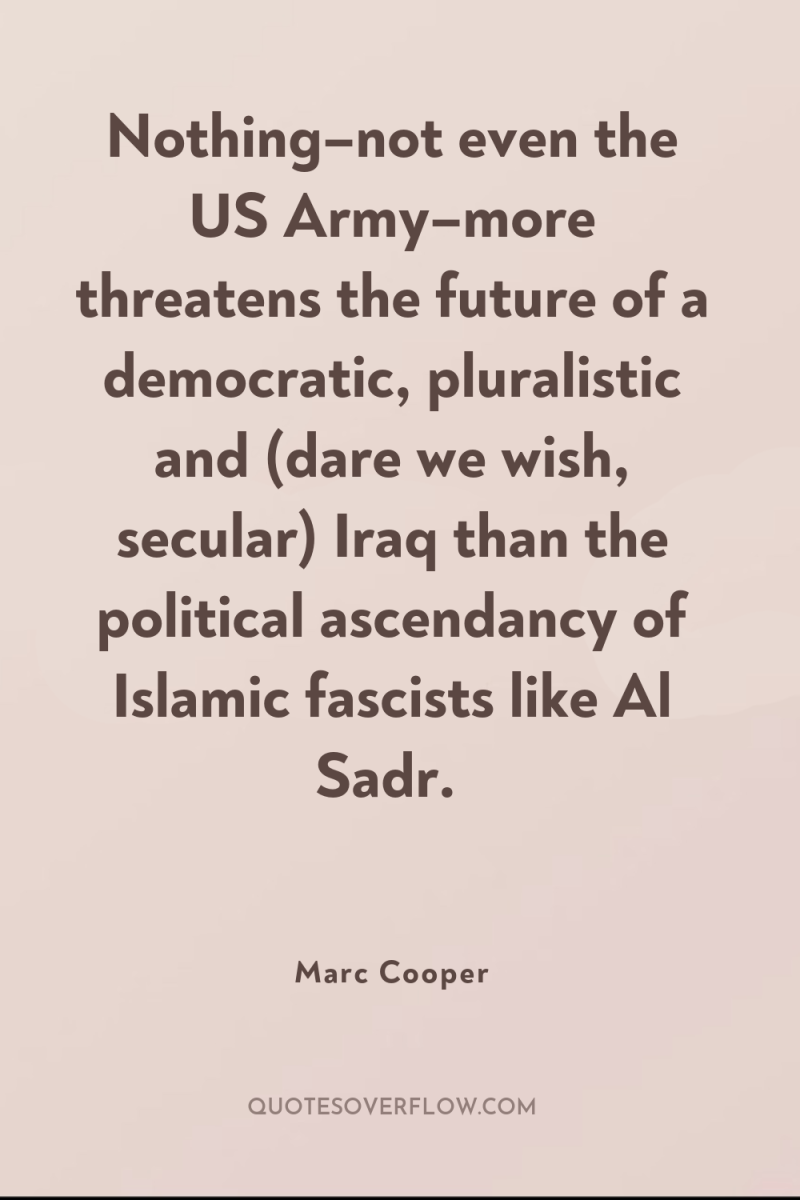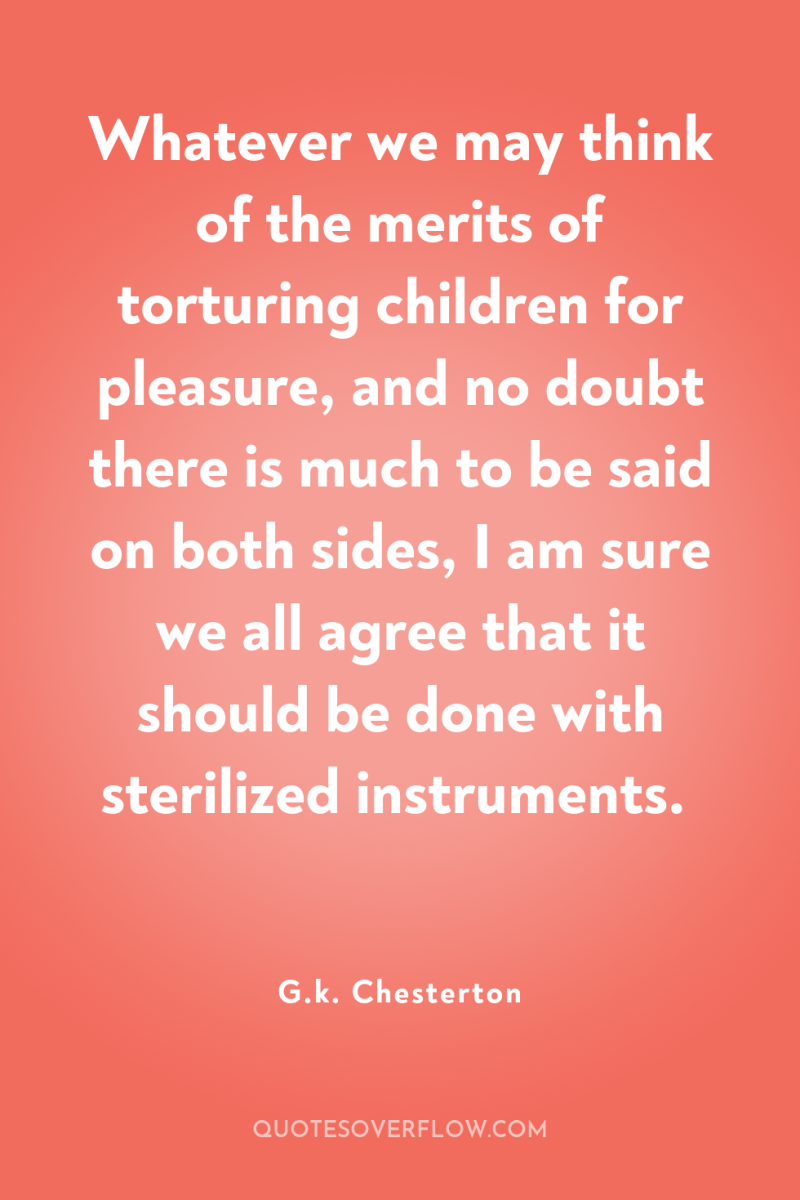1
It's a curious thing in American life that the most abject nonsense will be excused if the utterer can claim the sanction of religion. A country which forbids an established church by law is prey to any denomination. The best that can be said is that this is pluralism of a kind.Christopher Hitchens

2
We believe that religions are basically the same…they only differ on matters of creation, sin, heaven, hell, God, and salvation.Steve Turner

3
Nothing–not even the US Army–more threatens the future of a democratic, pluralistic and (dare we wish, secular) Iraq than the political ascendancy of Islamic fascists like Al Sadr.Marc Cooper
4
For alongside our famous individualism, there's another ingredient in the American saga- a belief that we're all connected as one people. If there's a child on the south side of Chicago who can't read, that matters to me- even if it's not my child. If there's a senior citizen somewhere who can't pay for their prescription drugs and has to choose between medicine and the rent, that makes my life poorer- even if it's not my grandparent. If there's an Arab-American family being rounded up without benefit of an attorney or due process, that that threatens my civil liberties. It is that fundamental belief- I am my brother’s keeper, I am my sister’s keeper- that makes this country work.Barack Obama

5
Whatever we may think of the merits of torturing children for pleasure, and no doubt there is much to be said on both sides, I am sure we all agree that it should be done with sterilized instruments.G.k. Chesterton
6
The construction of civilizational difference is not exclusive in any simple sense. The de-essentialization of Islam is paradigmatic for all thinking about the assimilation of non- European peoples to European civilization. The idea that people's historical experience is inessential to them, that it can be shed at will, makes it possible to argue more strongly for the Enlightenment's claim to universality: Muslims, as members of the abstract category "humans, " can be assimilated or (as some recent theorist have put it) "translated" into a global ("European") civilization once they have divested themselves of what many of them regard (mistakenly) as essential to themselves. The belief that human beings can be separated from their histories and traditions makes it possible to urge a Europeanization of the Islamic world. And by the same logic, it underlies the belief that the assimilation to Europe's civilization of Muslim immigrants who are--for good or for ill--already in European states is necessary and desirable.Talal Asad
7
The Christian belief is that Jesus, as God, is the only one who can bring humanity back to God. He was the only person in history with such a pedigree. 1 Timothy 2:5 tells us plainly, “There is one God, and there is one mediator between God and men, the man Christ Jesus.” As a man, he could represent humanity. He was tempted in every way, and yet he never sinned. Jesus is our proverbial “best foot forward” as far as humanity goes. Jesus is also God. As such he is able to serve as a “middle man” and usher us into the very presence of God.The amazing thing is that Jesus offers his righteousness to anyone who will receive it. Rather than being receptive to this offer, we complain there are not other ways to God. While it is incredibly gracious that God would offer any way back to him, people complain that he did not provide ten ways. The offer for salvation is available to all. Instead of being exclusive, Christianity is actually very inclusive. Everyone is welcome to come to Jesus. It does not matter who they are, or what they have done. The Bible tells us, “…whoever believes in him shall have eternal life” (John 3:16). Whether they be Jew, Hindu, Sikh, Greek, Canadian, African, athlete, entrepreneur, lawyer, or academic, the offer is there – come to Jesus.Jon Morrison
8
We are a pluralist civilisation because we allow mosques to be built in our countries, and we are not going to stop simply because Christian missionaries are thrown into prison in Kabul. If we did so, we, too, would become Taliban.Umberto Eco
9
At least for a moment we all saw, I think, that the danger of pluralism is that it becomes factionalism, and that if factions grind their separate axes too vociferously, something mutual, precious, and human is in danger of being drowned out and lost.Frederick Buechner
10
In the moral realm, there is very little consensus left in Western countries over the proper basis of moral behavior. And because of the power of the media, for millions of men and women the only venue where moral questions are discussed and weighed is the talk show, where more often than not the primary aim is to entertain, even shock, not to think. When Geraldo and Oprah become the arbiters of public morality, when the opinion of the latest media personality is sought on everything from abortion to transvestites, when banality is mistaken for profundity because [it's] uttered by a movie star or a basketball player, it is not surprising that there is less thought than hype. Oprah shapes more of the nation's grasp of right and wrong than most of the pulpits in the land. Personal and social ethics have been removed from the realms of truth and structures of thoughts; they have not only been relativized, but they have been democratized and trivialized.D.A. Carson
11
To respect the opinions of those who stand against you is nothing short of courageous.Raif Badawi
12
Walter Mignolo terms and articulates _critical cosmopolitanism, juxtaposing it with globalization, which is a process of "the homogeneity of the planet from above——economically, politically and culturally." Although _globalization from below_ is to counter _globalization from above_ from the experience and perspective of those who suffer from the consequences of _globalization from above_, cosmopolitanism differs, according to Mignolo, form these two types of globalization. Mignolo defines globalization as 'a set of designs to manage the world, ' and cosmopolitanism as 'a set of projects toward planetary conviviality .Namsoon Kang
13
Whenever one comes to the the table for interreligous dialogue, there is what I would call an _ecumenical taboo_ that one has to comply with. The ecumenical taboo_ does not exist in a written document, but people tend to practice it around the dialogue table. One should not raise, for instance, such questions as gender justice, sexual orientation issues, religious constructions of the other, multiple forms of violence in a religious community, or religious cooperation with neo/imperialism. each religion has its own _history of sin_ that has justified and perpetuated oppression and exclusion of certain groups of people through its own religious teaching, doctrine, and practice. In order to be _nice_ and _tolerant_ to one another, interreligious dialogue has not challenged the fundamental issues of injustice that a particular religion has practiced, justified, and perpetuated in various ways. I do not disregard that most ecumenists have based interreligious dialogue on a politics of tolerance, and this has played a significant role in easing the antagonism between religions, at least among the leaders of established religions. However, we should ground an authentic ecumenism and theology of religion in a _politics of affirmation and transformation, rather than a politics of tolerance_. .Namsoon Kang
14
Yet while I do this work because of my faith, I also recognize of course that in a pluralistic society there are many different perspectives. It is both unrealistic and wrong to insist that everyone hold my views, my faith. The place we meet, in our differences, is in the founding documents of our democratic republic.Simone Campbell
15
But a society in which pluralism is not undergirded by some shared values and held together by some measure of mutual trust simply cannot survive. Pluralism that reflects no commitments whatever to the common good is pluralism gone berserk.....Leaders unwilling to seek mutually workable arrangements within systems to their own are not surviving the long-term interest of their constituentsJohn W. Gardner
16
The lights became stars, which became streaks in the grayspace, and then networks of fading shimmersAshim Shanker
17
Light and Dark: each was unaware that the other existed.Ashim Shanker
18
At one moment, his eyes sparkled in the light and in the next they were enshrouded in shadow. What connected those bands of light and dark? Could they indeed have been distinct entities?Ashim Shanker
19
America, it is said, is suffering from intolerance – it is not. It is suffering from tolerance. Tolerance of right and wrong, truth and error, virtue and evil, Christ and chaos. Our country is not nearly so overrun with the bigoted as it is overrun with the broadminded.Fulton J. Sheen
20
A love of neighbor manifests itself in the tolerance not only of opinions of others but, what is more important, of the essence and uniqueness of others, when we subscribe to that religious philosophy of life that insists that God has made each man and woman an individual sacred personality endowed with a specific temperament, created with differing needs, hungers, dreams. This is a variegated, pluralistic world where no two stars are the same and every snowflake has its own distinctive pattern. God apparently did not want a regimented world of sameness. That is why creation is so manifold. So it is with us human beings. Some are born dynamic and restless; others placid and contemplative… One man’s temperament is full throated with laughter; another’s tinkles with the sad chimes of gentle melancholy. Our physiques are different, and that simple difference oftentimes drives us into conflicting fulfillment of our natures, to action or to thought, to passion or to denial, to conquest or to submission. There is here no fatalism of endowment. We can change and prune and shape the hedges of our being, but we must rebel against the sharp shears being wielded by other hands, cutting off the living branches of our spirits in order to make our personalities adornments for their dwellings.Joshua Loth Liebman
21
The construction of civilizational difference is not exclusive in any simple sense. The de-essentialization of Islam is paradigmatic for all thinking about the assimilation of non- European poeples to European civilization. The idea that people's historical experience is inessential to them, that it can be shed at will, makes it possible to argue more strongly for the Enlightenment's claim to universality: Muslims, as members of the abstract category "humans, " can be assimilated or (as some recent theorist have put it) "translated" into a global ("European") civilization once they have divested themselves of what many of them regard (mistakenly) as essential to themselves. The belief that human beings can be separated from their histories and traditions makes it possible to urge a Europeanization of the Islamic world. And by the same logic, it underlies the belief that the assimilation to Europe's civilization of Muslim immigrants who are--for good or for ill--already in European states is necessary and desirable.Talal Asad
22
It is not a Buddhist approach to say that if everyone practiced Buddhism, the world would be a better place. Wars and oppression begin from this kind of thinking.Sulak Sivaraksa
23
Evangelicals have squandered their cultural capital because they have tried to reclaim a standing in American culture that they never had. The American Founding was a mix of fragmented religious (and not-so-religious) voices.Joseph LaConte